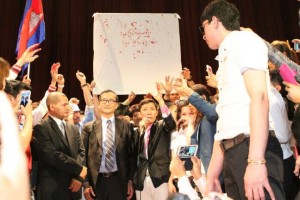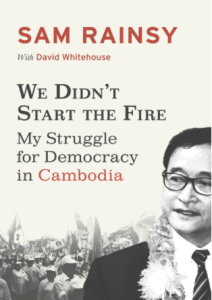
Courtesy of facebook’s Phanit’s profile
មនុស្សជាច្រើនបានចាប់អារម្មណ៍ចំពោះការចូលរួមនយោបាយរបស់យុវជនខ្មែរនៅកូរ៉េខាង ត្បូង។ ជាក់ស្តែង ពិធីរៀបចំទទួលបដិសណ្ឋារកិច្ចអ្នកនយោបាយសំខាន់ៗ ជាពិសេសលោក សម រង្ស៊ី ដែលជាប្រធានគណបក្សសង្រ្គោះជាតិកាលពីថ្ងៃទី២ មិថុនា ២០១៣ គឺបានទាក់ទាញ អារម្មណ៍របស់មហាជនជាខ្លាំងតាមរយះពត៌មាននិងបណ្តាញសង្គម។ កម្មវិធីមួយ ក្នុង ចំណោមកម្មវិធីជាច្រើន គឺការយកឡាមអាសាច់បង្ហូរឈាមដើម្បីសរសេរប្រយោគខ្លីៗនៅ លើផ្ទាំងក្រដាសស មានឧទាហរណ៍ដូចជា យើងស្រឡាញ់មាតុភូមិខ្មែរ ខ្មែរស្រឡាញ់ខ្មែរ និង មេដឹកនាំខ្មែរត្រូវមានភាពស្មោះត្រង់និងមានគុណធម៌ ជាដើម។
ទង្វើរដ៏ក្លាហាននេះបានពញ្ញាក់ស្មារតីខ្មែរទូទាំងពិភពលោក។ នៅពេលដែលពត៌មានក្នុងស្រុក គាំទ្រគណបក្សគ្រប់គ្រងអំណាចសរសេរថាលោកសម រង្ស៊ី ញុះញង់ក្រុមយុវជនដែលជា កម្មករអោយអាសាច់សំរក់ឈាមខ្លួនឯង យុវជនដែលជាវាគ្មិនសំរាប់កម្មវិធីបានចេញមក បដិសេធន៍តាមរយះវីដេអូខ្លីនៅតាមហ្វេសប៊ុក នូវការចោទប្រកាន់នោះ ដោយអះអាងថា ការធ្វើដូច្នោះគឺឈុតឆាកសំដែងរបស់ក្រុមសំដែងមួយដែលធ្វើឡើងដោយការស្ម័គ្រចិត្ត មិន មែនជាការអូសទាញឡើយ។


